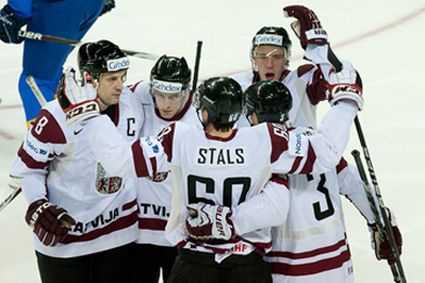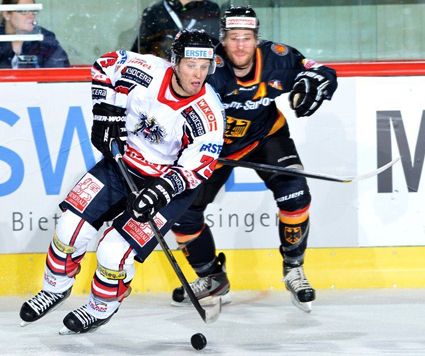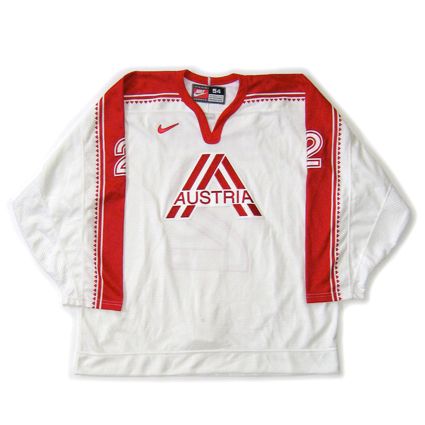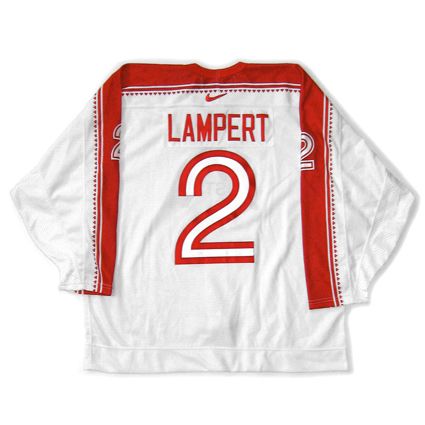First, in Group F, where Slovenia had already clinched their upset berth in Sochi, they backed up their earlier performance with a dominant victory lap over Ukraine by a score of 6-1.

A reminder, as determined Friday, Group A will consist of Russia (ranked #1 in the IIHF World Rankings) , Slovakia (6), the United States (7) and Slovenia (18).
France took a giant step toward that goal by taking a surprising 2-0 lead after one period, only to see goaltender Edgars Masalskis knuckle down as his teammates began to generate some much needed offense. Lauris Darzins got the home team on the board with a goal that took until 14:59 of the second period to arrive to cut the French lead to 2-1 after two periods.
Martins Karsums delighted the home supporters with the equalizer a mere 12 seconds into the third period to give Latvia the appearance of being on their way to Sochi. However, despite the shot of energy by the early goal, a third one was not in the cards for Latvia.
Unable to take the lead and breathe easy, it then became a matter of survival for Latvia as time wore down, as merely getting to overtime and earning a point in the standings was all Latvia required to win the group, but two French goals could steal it all away.
Things got interesting late when each team took a penalty at 17:10 for roughing and then France pulled goaltender Christobal Huet for a late man advantage at 18:06, only to have Kevin Hecquefeuille get called for cross-checking at 19:17.
In the end, Latvia was able to hold on through the end of regulation to claim the point needed to win the group and secure their place in Sochi, which should delight those responsible for ticket sales in Russia as well as their bar owners near the arena! The game was not over, however, and Pierre Edouard Bellemare won the game with a goal at 4:20 of overtime, but it came too late for France.

Meanwhile, Group D came down to rivals Germany and Austria with a similar scenario, Germany needing a regulation win and Austria needing only to reach overtime.
Germany took until 18:41 to claim the lead, but Austria was the next to score, tying the game with a goal by Andre Lakos at 11:46 of the second period. Michael Wolf gave the home fans hope with a power play goal at 6:54 of the third period, only to have Markus Peintner respond at 12:22 with the key goal for Austria.

10th ranked Germany pressed for the game winner, out shooting Austria 11-5 for the period, but goaltender Bernhard Starkbaum denied the Germans at every turn to secure the 15th ranked Austrians an upset place in Sochi, ending a streak of Olympic participation for Germany that dates back to 1928!
Of little consolation was the fact that, like France, Germany would actually go on to win the game in overtime when Patrick Reimer scored a power play goal at 2:34 of overtime, leaving the Germans to regret not just their overtime loss to Italy, but their dismal performance at the 2012 World Championships, where their 2-5 record (which included losses to Latvia and Norway) left them with a 12th place finish that dropped them from 8th in the World Rankings to 10th, costing them an automatic berth in Sochi for those in the top 9.
Austria (15) will find Finland (2), Canada (5) and Norway (8) awaiting them in Group B as the full field for Sochi is now set, and fans from Slovenia, Austria and especially Latvia can now begin making travel plans for February of 2014.
With teams ranked 10th (Germany), 11th (Latvia) and 12th (Denmark) having home ice advantage as the host nation for their group, it certainly was a surprising weekend, as the teams to advance were Latvia in 11th, Austria in 15th and 18th ranked Slovenia.
Today's featured jersey is a 2002 Austria National Team Michael Lampert jersey from the last time Austria competed in the Olympics back in 2002 in Salt Lake City. There, Austria lost to Latvia 4-2 and Germany 3-2 before defeating an undermanned Slovakia 3-2, as the NHL had yet to take a break to allow a number of their best players to compete in the Preliminary Round. Their 1-2 record left Austria in their place and only the winner of the group advancing to the First Round. Austria then lost to Switzerland 4-1, which left them classified in 12th place of the 14 teams.
This style of Austrian jersey was first adopted in 1998 and served them for a long time, seven seasons through 2004, with the trim detail on the arm stripe and their unique "soccer jersey" numbers being their most memorable design elements.













No comments:
Post a Comment
We welcome and encourage genuine comments and corrections from our readers. Please no spam. It will not be approved and never seen.